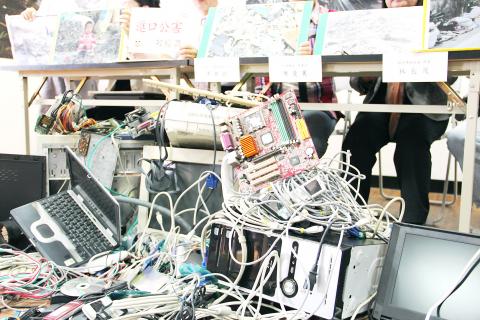Environmental activists yesterday urged the government not to exclude scrap metal, including electrical and electronics equipment, from its definition of hazardous industrial waste, as this would allow its import into Taiwan.
The Environmental Protection Administration (EPA) is considering amending the Standards for Defining Hazardous Industrial Waste (有害事業廢棄物認定標準) to exclude 12 types of scrap metal — including wires, computers, household electronics, telecom products and printed circuit boards — and redefine them as general industrial waste, which are not banned from import into the nation, environmental advocates said.
Showing photographs taken years ago of waste circuit boards and wires piled up along the banks of the Erjen River (二仁溪), with hundreds of fish lying dead on sections of the river bank, the groups said they fear that once the standards are amended, the public would see a repetition of those horrific scenes of rivers polluted by toxic chemicals across the nation.

Photo: CNA
Homemakers United Foundation president Chen Man-li (陳曼麗) said 1,800 tonnes of domestic industrial waste are created each year, and while the EPA claims a high recycling rate of 82 percent, many toxic substances, such as furnace slag ashes, remain and pollute the environment.
“Don’t we have enough domestic industrial waste to worry about?” Chen asked.
“The public is now worried about the safety of adulterated edible oil products, but the pollution from recycling these scrap metals may affect an even bigger portion of our living environment,” she said.
Tainan Community University Research and Development Association director Huang Huan-chang (黃煥彰) said since the early 1970s, the scrap metal recycling industry by the Erjen River has already caused irreversible heavy pollution to the air, water and soil, from the burning of plastic parts and pickling metal with strong liquid acid to extract precious metals.
He said that the high level of dioxins in the air and heavy metal contamination in the water and soil near the Erjen River led a Canadian researcher to define the area as “unsuitable for living” in 1983. The pollution was finally halted by the government, which spent up to NT$4.2 billion (US$142.5 million) for river remediation over the past two to three decades.
Taiwan Watch Institute director Herlin Hsieh (謝和霖) said many of the waste electronic products contain brominated flame retardant, which may release highly toxic polybrominated dibenzo-p-dioxins and dibenzofurans when burned and are endocrine disrupting chemicals that may affect the brain.
“The main objective of the Basel Convention on the Control of Transboundary Movements of Hazardous Wastes and their Disposal is to restrict transboundary movements of hazardous wastes,” Huang said.
“Taiwan is a small island that cannot afford to become a hazardous waste treatment center for other countries,” Huang said.
In response, EPA Department of Waste Management director Wu Tien-chi (吳天基) said that while the nation lacks resources, it is an electronics export-oriented economy.
To vertically integrate the industry from manufacturing to consumption to recycling, the EPA is considering allowing the import of scrap metal to aid the development of the recycling industry.
Recycling companies will be required to report their treatment process, and the remaining waste substances will be disposed of using legal facilities, he added.

Alain Robert, known as the "French Spider-Man," praised Alex Honnold as exceptionally well-prepared after the US climber completed a free solo ascent of Taipei 101 yesterday. Robert said Honnold's ascent of the 508m-tall skyscraper in just more than one-and-a-half hours without using safety ropes or equipment was a remarkable achievement. "This is my life," he said in an interview conducted in French, adding that he liked the feeling of being "on the edge of danger." The 63-year-old Frenchman climbed Taipei 101 using ropes in December 2004, taking about four hours to reach the top. On a one-to-10 scale of difficulty, Robert said Taipei 101

Nipah virus infection is to be officially listed as a category 5 notifiable infectious disease in Taiwan in March, while clinical treatment guidelines are being formulated, the Centers for Disease Control (CDC) said yesterday. With Nipah infections being reported in other countries and considering its relatively high fatality rate, the centers on Jan. 16 announced that it would be listed as a notifiable infectious disease to bolster the nation’s systematic early warning system and increase public awareness, the CDC said. Bangladesh reported four fatal cases last year in separate districts, with three linked to raw date palm sap consumption, CDC Epidemic Intelligence

Taiwanese and US defense groups are collaborating to introduce deployable, semi-autonomous manufacturing systems for drones and components in a boost to the nation’s supply chain resilience. Taiwan’s G-Tech Optroelectronics Corp subsidiary GTOC and the US’ Aerkomm Inc on Friday announced an agreement with fellow US-based Firestorm Lab to adopt the latter’s xCell, a technology featuring 3D printers fitted in 6.1m container units. The systems enable aerial platforms and parts to be produced in high volumes from dispersed nodes capable of rapid redeployment, to minimize the risk of enemy strikes and to meet field requirements, they said. Firestorm chief technology officer Ian Muceus said

MORE FALL: An investigation into one of Xi’s key cronies, part of a broader ‘anti-corruption’ drive, indicates that he might have a deep distrust in the military, an expert said China’s latest military purge underscores systemic risks in its shift from collective leadership to sole rule under Chinese President Xi Jinping (習近平), and could disrupt its chain of command and military capabilities, a national security official said yesterday. If decisionmaking within the Chinese Communist Party has become “irrational” under one-man rule, the Taiwan Strait and the regional situation must be approached with extreme caution, given unforeseen risks, they added. The anonymous official made the remarks as China’s Central Military Commission Vice Chairman Zhang Youxia (張又俠) and Joint Staff Department Chief of Staff Liu Zhenli (劉振立) were reportedly being investigated for suspected “serious